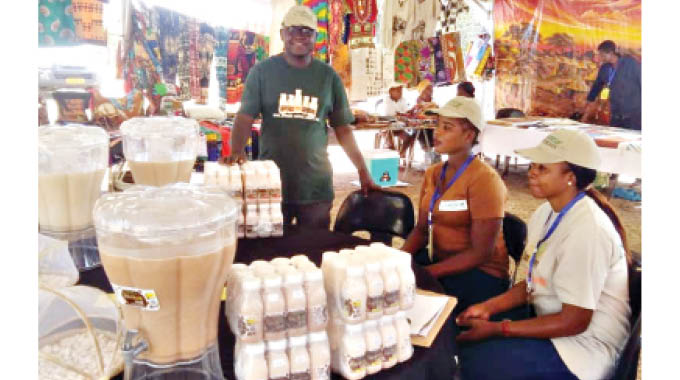
Leonard Ncube, Victoria Falls Reporter
THE baobab tree has become an important source of enhanced livelihoods in Zimbabwe.
Communities that live in regions where the tree is found are now using it as a source of income as well as for medicinal purposes. It appears it took many years for people to realise that the baobab has many uses including nutritional advantages as its fruit has lots of vitamin C while the leaves are also eaten and the fibre from the bark used to weave mats, bags and hats.
Two locals from Beitbridge, Mr Kudakwashe Garaipasi and Dr Annah Mleya realised the selling potential and started a baobab processing company, Essential Delights, last year. The young firm is located in Beitbridge and employs 17 people. Scores of community members earn a living by gathering the fruit and supplying the company.
Essential Delights produces a wide range of products such as baobab juices, baobab mahewu, traditional opaque beer called Mahafhe in Venda language, baobab creams, baobab oil, yoghurt, baobab coffee, energy drinks, purified water and instant porridge.
Business Chronicle caught up with Mr Garaipasi at the recent Victoria Falls Agricultural Show where the firm was exhibiting for the first time. Mr Garaipasi said on a good day they make between 1 500 and 2 000 beverage bottles per hour, which makes it more than 70 000 units per month.
“We believe Zimbabwe has all the raw materials hence we need to make end products for consumption. We believe in industrialisation and the Zimbabwe is open for business mantra hence we are making inroads into markets countrywide,” he said.
“We are supplying wholesalers, retailers, shops, hotels, and lodges and have also managed to attract clients in Mozambique, South Africa and Botswana,” said Mr Garaipasi.
He said they were buying sacks of the fruits from people who gather the raw material from the bush. In some countries such as Kenya and Tanzania, the baobab business has grown big such that people climb trees to harvest more as this has become a sustainable source of income for communities where in other countries one can earn up to US$20 per bag of raw fruit.
Some are even growing baobab plantations, although the tree starts bearing fruits at 25 years. At Essential Delights they open the green shell and a machine separates baobab powder from the seeds, which are also pressed to process baobab oil.
The powder makes tangy and extremely healthy crush, which is used to produce various products. The citrus fruit is rich in vitamin, calcium and magnesium.
Mr Garaipasi bemoaned fluctuating prices of raw materials and products. He, however, expressed gratitude to Government for helping small to medium enterprises through various programmes.
“We make between 1 500 and 2 000 bottles per hour making more than 70 000 units per month. We believe that markets want quality products and also continuous supply hence we are always constant on producing the best and also efficient marketing,” said Mr Garaipasi.
“We believe the beverage production that we have started is the best as people love our products. We see our company having many production plants and stockists in many countries and across Zimbabwe.”
The company has exhibited at the Beitbridge Business Expo, Gwanda Agric Show, Westgate marathon, Zimbabwe Agric Show, Sanganai/Hlanganani World Tourism Expo, Victoria Falls Agric Show, Zimbabwe Tourism Authority events, Land Rover Defender Tournament at Mapungubwe Transfrontier Park and Africa Youth Tourism at the Zimbabwe international Trade Fair.
“We capitalise on trade expos where we showcase our stuff and attract market and these expos link us with the market and clients,” said Mr Garaipasi.
The business is grateful to Government for opening linkages for greater opportunities and has appealed for more assistance to grow bigger and export to show that Zimbabwe can produce using available natural resources.
Some women groups in Hwange and Lupane also make baobab juices including freezits at a small scale. There are export opportunities for baobab products as the fruit is popular in the United States and Europe.
For centuries the baobab tree has been ignored as one of the ordinary species with no extraordinary benefits. Also called the ‘African upside down’ tree because it looks as though the tree has been buried underground with roots in the air, the baobab grows in arid regions.
In Zimbabwe it is common in Matabeleland North and Matabeleland South, particularly in Hwange and Beitbridge districts. It is also common in the southern parts of the Midlands and Masvingo provinces.
In severe droughts the baobab trunk shrinks and then enlarges again when the rains come and the water is replaced in the huge trunk. Also, as the tree gets older, the middle of the trunk naturally gets hollowed out and is sometimes used as a habitat by some animals. Some call it the ‘tree of life’ because of its spongy fibre trunk that can store over 100 000 litres of water to keep it alive in times of poor rainfall. — @ncubeleon
